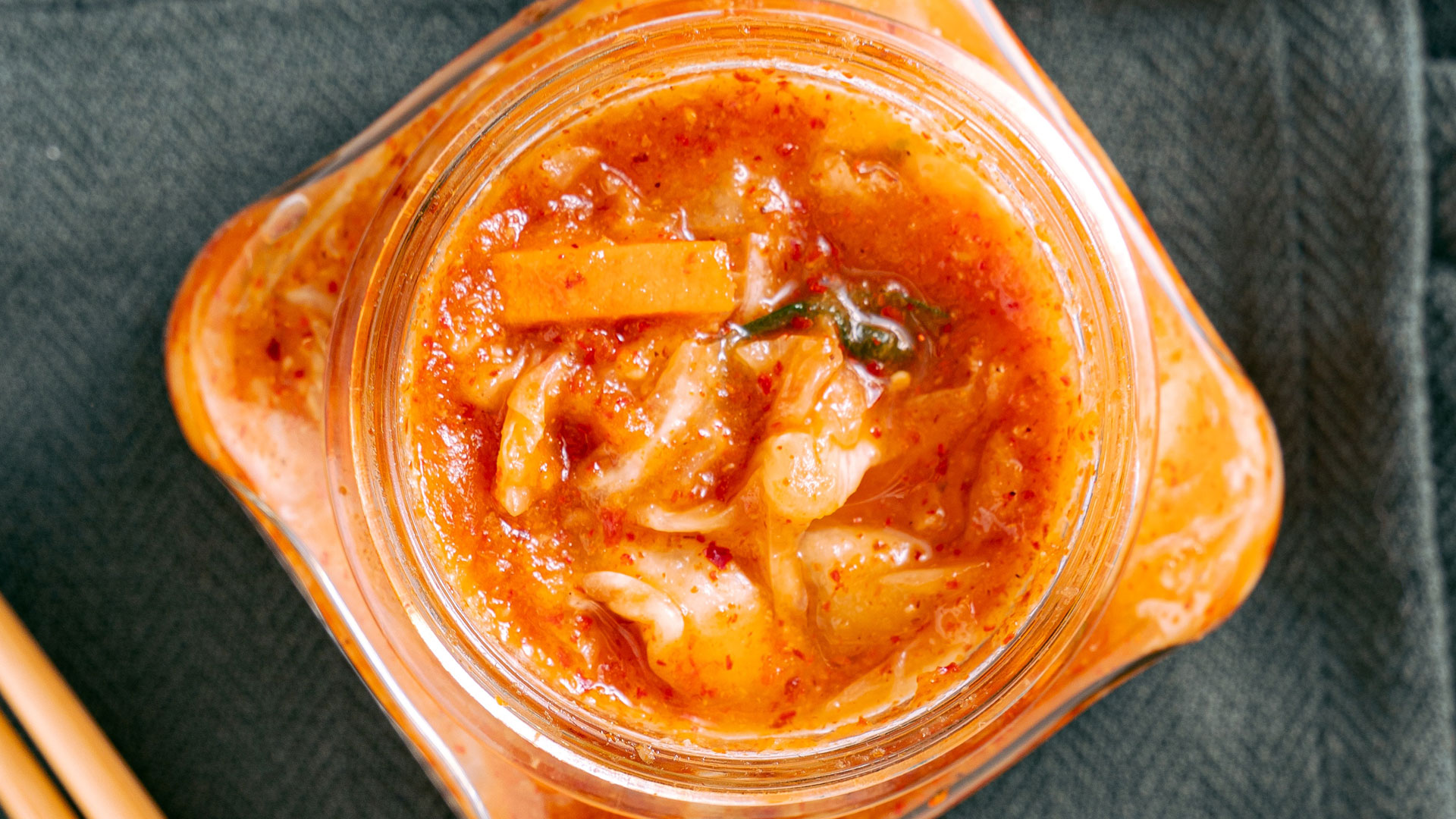Between fighting inflammation to strengthening your immune system, the health benefits of kimchi are numerous! This traditional Korean side dish is delicious, but also healthy, too. Keep reading to discover kimchi’s incredible health benefits.

This post may contain affiliate links. Please read my disclaimer.
What Is Kimchi?
Kimchi, a traditional Korean side dish, is a fermented cabbage dish from Korea that has piqued the recent interest in the health industry.
Its primary ingredient is cabbage, seasonings like salt, pepper, ginger, garlic, and fish sauce. You can also add other vegetables to this dish, like radishes, celery, carrots, etc.
What Is Kimchi?
Kimchi, a traditional Korean side dish, is a fermented cabbage dish from Korea that has piqued the recent interest in the health industry.
Its primary ingredient is cabbage, seasonings like salt, pepper, ginger, garlic, and fish sauce. You can also add other vegetables to this dish, like radishes, celery, carrots, etc.
6 Different Types of Kimchi Explained
Several other kinds of kimchi vary from the traditional version of this dish. Before we discuss the health benefits of kimchi, let’s take a look at some of them!
1. Baechu Kimchi
This is a familiar and well-loved kimchi variant called “pogi kimchi.” You can make this dish from napa cabbage, pepper flakes, and other seasonings.
After preparation, the dish is stored in a container and can be left to ferment for weeks. Fermentation periods longer than three weeks will soften the cabbage and reduce its acidity.
2. Gat Kimchi
Gat Kimchi is a peculiar version of kimchi, which you can prepare with Korean mustard leaves that are very tangy.
3. Buddhist Baechu Kimchi
Korean monks do not eat certain spices and vegetables like onions, garlic, and chives. The reason why is that they believe that these items are associated with unacceptable emotions, like anger.
To accommodate this belief, monks prepare this kimchi with soy sauce or fermented soybean paste, mustard greens, mushrooms, ginger, radish, and red pepper.

4. Kkakdugi
In English, this translates to “cubed radish kimchi.” You can make this from a specific cubed radish called Mu, a large white radish with one green end.
5. Baek Kimchi
This is a milder form of the traditional napa cabbage kimchi. It shares the same process as Baechu but has a unique mix of radishes, chives, chestnuts, garlic, Korean pear, and jujubes. This variant is usually preserved and served in a fruit brine.
6. Geotjeori
This is the only modified kimchi form eaten without fermenting. Essentially, it is Baechu Kimchi that was not allowed to ferment.

10 Health Benefits of Kimchi
1. Healthy Microbes and Probiotics
Meals with kimchi will improve microbe balance and bowel function. Why?
Because kimchi contains friendly microbes, also called probiotics, which can help manage irritable bowel syndrome.
In addition, beneficial bacteria within the gut result in health benefits like better digestion, a better immune system, and managing a healthy weight.
Kimchi is high in probiotics, positively influencing the microbiome.
2. Fiber
Vegetables have high fiber content. A diet high in fiber can maintain your gut health, lower cholesterol, and help control blood sugar levels.
Also, since the main ingredients in kimchi are veggies, this food can keep your bowels moving.
3. Antioxidants
Vegetables like cabbage have high polyphenol content. Polyphenols are antioxidants that protect your cells from free radicals. Therefore, antioxidants are an essential part of a balanced diet.
When you have an abnormal concentration of oxidants in your body, your cells will be affected, causing cellular aging and degeneration.
In addition, too many oxidants in the body correlate with an increased risk of cancer, Alzheimer’s, diabetes, and cardiovascular diseases.
4. Heart Health
Another health benefit of kimchi is that it can help maintain the health of your heart.
Due to its low-fat content, antioxidants, and anti-inflammatory properties, kimchi can help manage the risk of heart disease, stroke, and diabetes.
It also reduces the general cholesterol level of your body.
5. Blood Sugar
Type 2 diabetes occurs when the body can not efficiently break down the sugar. This causes sugar to stay in the bloodstream, negatively affecting overall health.
Consistent ingestion of kimchi can boost the digestion of glucose and other sugars.
However, note that kimchi is very salty, so restrict yourself to two to three servings per week.
You May Also Like:
- The Easiest Recipe for Kimchi Fried Rice (Under 30 Minutes)
- The Easiest Recipe for Korean Soft Tofu Soup
6. Improved Vision
Kimchi vegetables are rich in beta carotenes which convert to Vitamin A during digestion.
This is the vitamin responsible for eyesight and vision and is one of the essential nutrients in terms of eye health.
So, as you age, you should add more foods rich in carotenoids to your diet.
7. Weight Loss
A 4-week study found that eating fermented or fresh kimchi helped reduce body mass index, weight, and fat.
Although it is unclear what makes kimchi successful for aiding in weight loss, it is likely a combination of its high fiber content, low-calorie count, and probiotics.
8. Nutrient-Dense
Kimchi has plenty of minerals, vitamins, and amino acids essential to human health. Its primary ingredient, napa cabbage, has ten distinct minerals and 34 amino acids.
This cabbage contains Vitamin A and Vitamin C. In addition, it is high in Vitamin K, which plays a role in blood clotting and bone metabolism.
It is also high in riboflavin, helping to regulate energy production, metabolism, and cellular growth. So who needs a vitamin supplement when you can take a daily dose of kimchi?
9. Aids With Yeast Infections
The fungus responsible for yeast infections is slowly becoming resistant to antibiotics. Still, research shows that some probiotics may be able to fight against this infection.
While there hasn’t been extensive research yet, studies have shown that kimchi displays anti-microbial activity against the fungus that causes yeast infections.
10. Immune System
The numerous nutrients in kimchi are known to perform essential functions in your body.
One bacterium, in particular, Lactobacillus, found in kimchi, has been shown to lower levels of specific inflammatory markers.
In addition, a test-tube study showed that this bacterium has immune-enhancing effects, but human research is still needed.
The Takeaway
Kimchi is a tasty side dish for lunch or dinner, especially Asian cuisine. In addition, the health benefits of kimchi mean that you can feel good about incorporating more of it into your family’s meals.
Stir it into your fried rice, throw it in a green salad, or put it in a soup. In conclusion, this delicious, fermented food will not only make your tastebuds happy but also your body.
Did you find this post helpful? Leave a comment and let me know! I’d love to hear from you.
Disclaimer: This content is meant for informational and educational purposes, only. It is not intended to provide medical advice or take the place of such advice from a personal physician. Please consult with your doctor regarding specific health and lifestyle questions and concerns.

